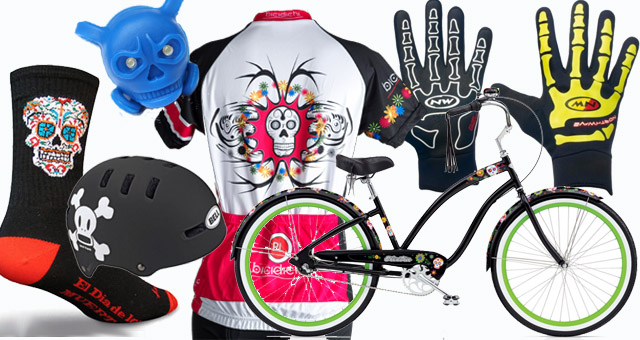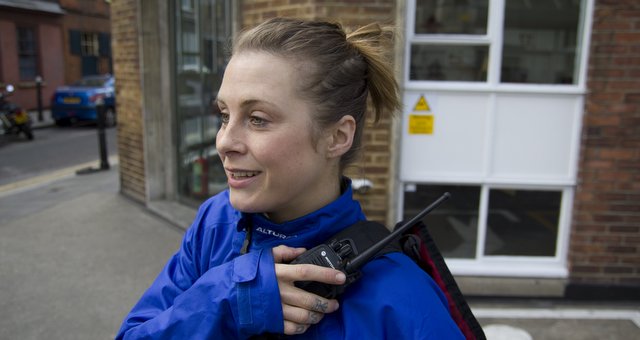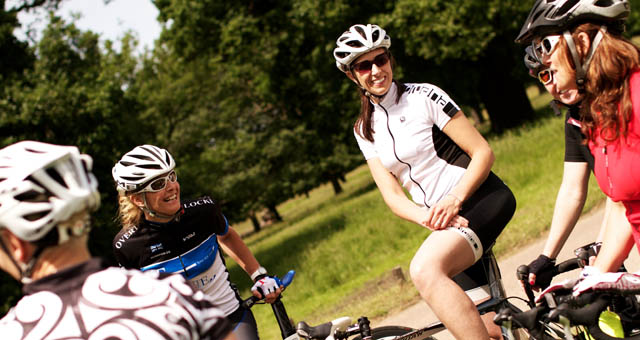Being a courier is incredibly hard work. Combine poor pay, a demanding work load, daily physical exertion and you begin to wonder why anyone would choose this line of work.

Urban Birds, a short film documenting the life of four London-based female couriers, will have you see the flip side of a courier’s life. That it’s not all doom and gloom, but a tight-knit community who enjoy living life on the edge, away from the monotony of office jobs.
We spoke with Gemma Burditt and Marigold Hughes who co-directed Urban Birds, documenting the lives of Emily, Apryl, Ale and Stephanie – all real life couriers, traversing the streets of the UK’s capital.
What are the particular challenges female couriers face in this city?
Marigold Hughes: When we first started interviewing couriers for the film and developing ideas – we were intending to focus on the “female-ness” of the couriers and how their gender impacted upon their life on the road.
Once we got further into the process, however, it seemed less and less important – we became more interested in the personalities, choices and motivations of the women and the fact that they were women soon became fairly meaningless. They all spoke positively about the fact that their colleagues – predominately male – respected them and valued what they did.
 None of them ever spoke about facing challenges related to their gender. Indeed, one of the couriers that we interviewed early on – who isn’t in the film – said that she was once in a bit of an altercation with a “white van man”, who was having a go at her. It was winter and she was all wrapped up and her hair was covered, but when she looked up and he saw she was a woman – he began apologising profusely. I guess on the road, some of the traditional, “ladies first” approach still persists, for better or for worse.
None of them ever spoke about facing challenges related to their gender. Indeed, one of the couriers that we interviewed early on – who isn’t in the film – said that she was once in a bit of an altercation with a “white van man”, who was having a go at her. It was winter and she was all wrapped up and her hair was covered, but when she looked up and he saw she was a woman – he began apologising profusely. I guess on the road, some of the traditional, “ladies first” approach still persists, for better or for worse.
What inspired you to make this film?
Gemma Burditt: Ever since I moved to London I have always been slightly intrigued by couriers and always wondered what sort of lives they lead and why in particular there weren’t many female couriers.
Marigold worked for a short period as a courier and when we were looking for a documentary idea, she suggested making a film about female couriers. We felt the idea worked on many different levels, the lives of the girls, couriering as a whole and also around the idea that London was like an ecosystem of workers, and what role couriers had in this landscape. As work becomes more cerebral and static we wanted to find out about the joys of having a physical job.
Tell us a bit about the girls in the film: what makes them unique?
Marigold Hughes: Well, they are unique in the sense that everyone is, but we weren’t exactly looking for “unique-ness”. We interviewed about 10 female couriers when we began research for the film; all the ladies we met had made interesting choices, their reflected on the joys and drawbacks of being a courier with wit and insight and any one of them could have been featured in the film.

What we were looking for more specifically was a contrast in experience – for example Stephanie had been doing the job for around 10 years when we started filming and Ale had been doing it for less than 1 year; we were also looking for a contrast in personalities and in the way the approached the job.
With Stephanie, we were drawn to her grounded, philosophical perspective on couriering and to her position in the community – she is the don of the couriering world. With Ale, we liked her playful, quite erratic, restless energy and how that manifested in her life on the road and we were drawn to Apryl’s easy-going, freedom hunting mission and the place that couriering had within that.
We wanted to make these contrasts visible on screen and in so doing, capture the “pull” of the job from a number of different viewpoints.
Can you tell us a bit about female couriers worldwide?
Gemma Burditt: There are girls working as couriers in all the major capitals around the world, some of whom we spoke to during the course of filming. This courier community seems to extend worldwide with numerous couriering and alley cat events where they come together to race.
How do the female bike messengers relate to other female cyclists Athletes?
Marigold Hughes: Couriers are athletes; they cycle between 40-60 miles a day and it is an incredibly physically demanding job. I think the main difference between them and “civilian” cyclists is the amount of time they spend on the road and their natural, territorial attachment to them.

While other “female” cyclists use the road to commute to and from work – the roads are the work of the courier. They are also obviously paid to do the job and, for the time they are doing it, it is their profession. This gives them a slightly different role in the eco-system of the traffic, not superior – but different. Their offices are the streets of London.
What message are you hoping to give with this film?
Gemma Burditt: I think we were both very much in admiration of the girls and what they did, the physical demands of the job and the united quest for a freedom in their chosen life. I think if you ask most people what they love about cycling, it is a sense of freedom. We also wanted to touch on the sense of community within the courier scene and to ask questions about how working inside all day in front of a computer can affect our wellbeing, what alternatives are there out there?
Want to watch Urban Birds? Get tickets for the London Bicycle Film Festival on Saturday and you’ll be able to indulge in this film and many more bicycle related visual goodies!
We also have a competition running to win a pair of tickets to the London Bicycle Film Festival. Choose the viewings on Saturday to be able to see Urban Birds.





